Zhejiang Clinical Observers Program in 2024 by London NHS Trusts
From March 23, 2024, to June 19, 2024, I participated in the Zhejiang Clinical Observers Program organized by the Zhejiang Provincial Health Commission. This program is held by London NHS Trusts, which includes St George’s University Hospitals NHS Foundation Trust, King's College Hospital NHS Foundation Trust, the Royal Marsden NHS Foundation Trust, and Barts Health NHS Trust; I mainly work in St George’s University Hospital as a urologist and andrologist. My mentor is Mr. Rami ISSA, an outstanding urologist consultant, known for his skilled robotic surgery, specializing in urological tumor surgery. During the three months of training, I learned clinical knowledge and skills and a deep understanding of the NHS system, hospital culture, and diagnosis and treatment concepts. (Fig1-3)
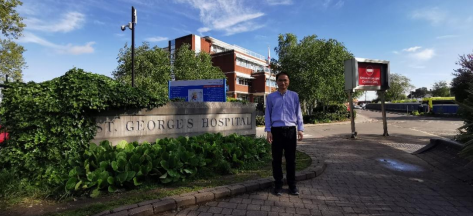
Fig1 Taking a photo with the St George’s University Hospital.
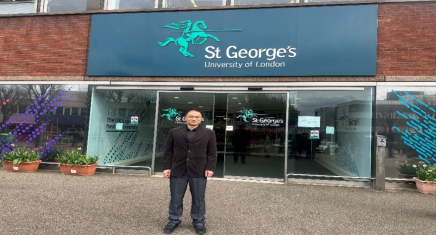
Fig2 Taking a photo with the St George’s University.
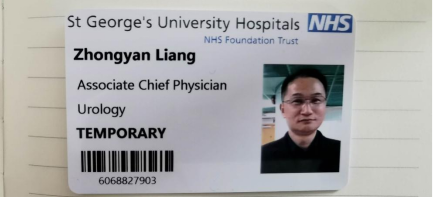
Fig3 My NHS card in the UK
My training tasks include:
1. Observe surgery with the Da Vinci robot system in urological diseases. St George’s University Hospital (SGH) is the largest public hospital in the UK. Its urology department is one of the experienced departments. It started robotic surgery in urology 16 years ago, with many surgical cases and a wide range of diseases. My instructor, Mr. Rami Issa, specializes in robotic surgery and is currently the consultant with the most robotic surgeries at SGH. During my training in the UK, I observed 34 robotic surgeries as an observer, including total nephrectomy, partial nephrectomy, total cystectomy + Brickel ileal bladder replacement, radical prostatectomy, etc. Two urology robot systems (Da Vinci Xi) are equipped with a dedicated operating room and a complete imaging teaching system. During the observation period, not only can you understand the relevant anatomy and surgical procedures more clearly, but you can also receive careful teaching and answers to many questions from your instructor and other colleagues in the urology department so that you can understand urology surgery under the robot from a holistic perspective. The future development trend may be the deep integration of PACS system imaging data and intervention in robotic surgery by artificial intelligence (AI). (Fig4-6)
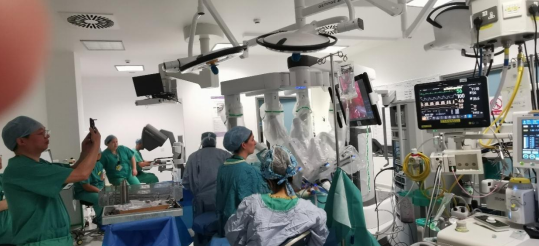
Fig4 Robotic surgery overview in SGH.

Fig5 Robotic surgery currently and in the future.
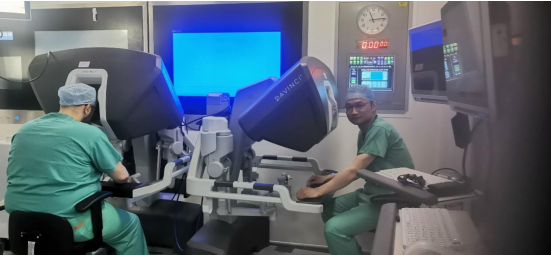
Fig6 I attended a robotic surgery
2. Surgery focuses on the male reproductive as well as diagnoses and treatment of male infertility. SGH's andrology department is affiliated with the Department of Urology. It is currently the largest penile cancer treatment center in the UK. There are many consultants, and the current director of urology, Mr. Ayres, is one of the andrology consultants. During the training period, I observed many male surgeries, including radical surgery of penile cancer + lymph node dissection, prosthesis implantation, various external genitalia plastic surgery, etc. The use of radionuclide positioning and intraoperative dye guidance in lymph node dissection has good guiding significance. The consultants of plastic surgery mostly have plastic surgery skills and thinking, and I benefited a lot. At the same time, I went to the clinic with many andrology consultants to understand the latest diagnoses treatment guidelines, and clinical ideas. Assisted reproductive technology in the UK is mostly concentrated in private hospitals. SGH has certain business related to male reproduction, such as carrying out more varicocele surgery and vasectomy surgery, etc. Compared with us, there is no special advantage. (Fig 7)
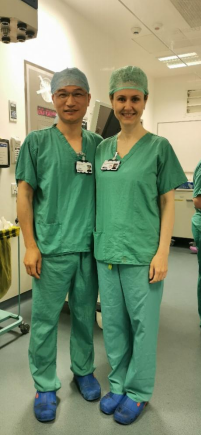
Fig7 Take a photo with the consultant (Marta Skrodzka) in the Andrology group.
3. Female urological diseases related to gynecology and obstetrics. Fortunately, my main supervisor, Mr. Rami Issa, is good at urological surgery and responsible for many consultation surgeries related to urology in the entire SGH hospital, especially urological complications in gynecology and obstetrics. During the training period, I followed my supervisor to observe the treatment of complex postpartum ureteral opening injury and bleeding; robotic surgery for deep gynecological endometriosis, and robotic surgery for inflammatory infertility. The latter two were the first attempts of gynecological robotic surgery in SGH. The operation went smoothly and the effect was excellent. I also achieved this training goal and will be able to assist in carrying out such projects in my unit (gynecology and obstetrics hospital) in the future. (Fig 8-9)
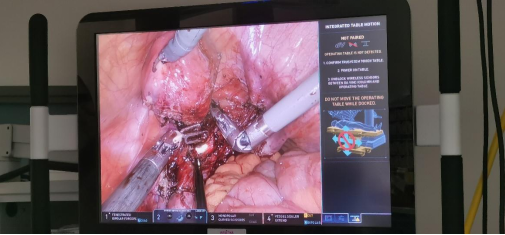
Fig8 Hysterectomy with a robotic system
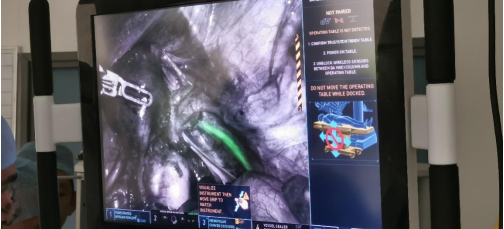
Fig9 The ureter appears green during surgery by injection of ICG
This time, my training involved two hospitals, St. George's Hospital and Royal London Hospital, with three campuses. The focus was on surgical observation, but it also involved outpatient clinics, ward rounds, teachings, and the operations and management of some departments. From a personal and professional perspective, the training mission was completed. (Fig 10)
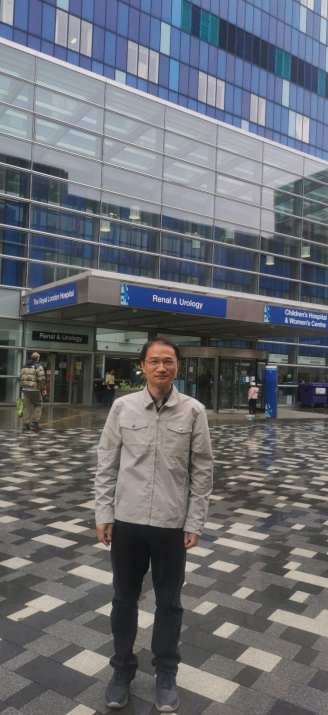
Fig10 Taking a photo with the Royal London Hospital.
4. How does the British medical system and medical insurance system work? (Preliminary understanding of the operation of the British health system). The delegation has pre-job training this time, and part of the content is related to this. The NHS system is a basic national policy of the United Kingdom. The core concept of the NHS is humanistic care. It involves systems, structures, medical and nursing staff's diagnosis and treatment activities, payment of fees, connection with the economic system, multi-point medical and nursing practice, and supervision of continuous improvement. Its implementation comes from universal free medical care under high taxation, and private hospitals are supplemented by fee-paying hospitals. Medical and nursing staff can practice at multiple points, which has been very reasonable for many years. In recent years, due to the aging population, the increase in the incidence of tumors, and the number of immigrants, there has been a shortage of medical staff and the growing medical payment costs, which have faced certain challenges. Compared with my country, its basic medical activities are mainly carried out by general practitioners (GP, General practitioners), and large public hospitals are mainly responsible for dealing with major diseases (surgery), but there are certain efficiency problems. In recent years, the registration and appointment of surgery for tumor patients has been accelerated. Compared with the current stage in my country, public hospitals in the UK have problems with low efficiency in medical examinations and surgeries. My country's medical insurance system is becoming more reasonable, the medical burden of the people is further reduced, the scale of large public hospitals is expanding, high-quality medical resources are continuously expanding, and the quality of county-level medical care is continuously improving. This is a medical reform path that conforms to China's national conditions and the wishes of the people. From my point of view, the NHS's operation path with general practitioners (GP) as the core of diagnosis and treatment is not suitable for China. In addition, the domestic idea of developing public hospitals has been proven in practice. It is possible to set up international districts within public hospitals to adapt to the requirements of special medical services, like private hospitals and private clinics in the UK. (Fig 11-13)
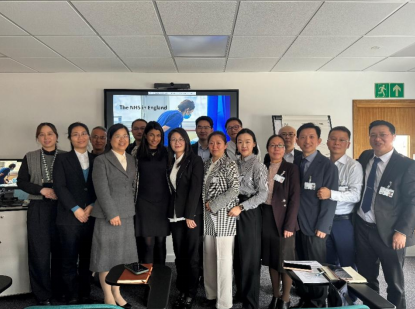
Fig11 pre-job training about NHS
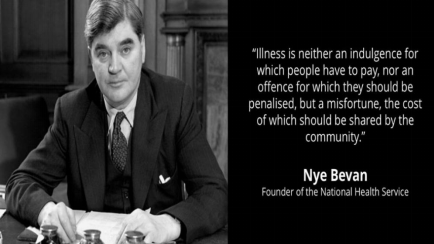
Fig 12 The core concept of the NHS is humanistic care
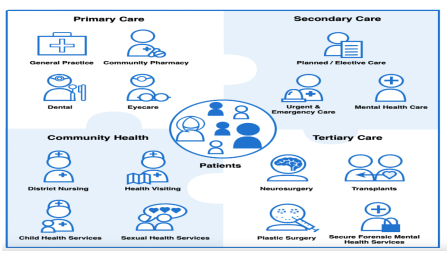
Fig13 NHS tertiary care
5. Sub-specialization of SGH Urology Department and sub-specialization of consultants. The Urology Department is one of the trump cards of SGH. It currently has five sub-specialty groups, including an andrology group, a benign disease group, a kidney tumor group, a bladder and prostate tumor group, and an emergency group. Sub-specialization enables consultants to do fine and detailed work and specialize in cutting-edge and high-precision technologies based on comprehensiveness. Under this idea, SGH's urology robot technology started very early, and now it is large in scale, strong in influence, and has good surgical results for patients. Therefore, the sub-specialization setting for consultants is an important means for the department to continue to develop and stand at the forefront. (Fig 14)
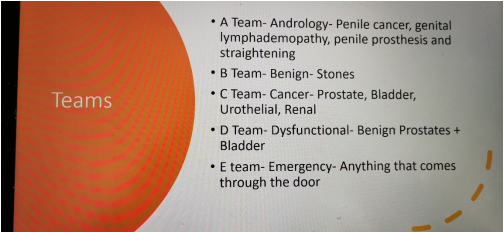
Fig13 Five sub-specialty groups in the SGH Urology Department
6. Normalization of the application of MDT multidisciplinary discussion. The Urology Department holds a multidisciplinary discussion (MDT, multidisciplinary team) every Wednesday morning, which is divided into three parts, including MDT with the Radiology Department, MDT of each sub-specialty group, and MDT of multiple disciplines within the hospital; MDT is required before and after all surgeries, and there is a special online conference system and an MDT procedure independent of the NHS medical system. MDT implements a flat hierarchy discussion MDT, which means that people have equal status and level during discussions, and they can speak freely focusing on the condition. The flat professional title system helps to ensure the safety and effectiveness of patient diagnosis and treatment and is one of the effective means to improve the level of diagnosis and treatment. It is also one of the means for young doctors to improve their diagnosis and treatment levels. (Fig 15)

Fig 15 MDT in the SGH Urology Department
7. The current diagnosis and treatment concept is reasonable. The current diagnosis and treatment are guided by clinical guidelines and disease-related data. Clinical guidelines ensure stable medical quality. Disease-related data are provided to patients, such as postoperative survival rate and recurrence rate so that patients can fully know and understand the risks and then make choices. Humanistic care is reflected everywhere in diagnosis and treatment activities. For example, patient privacy is very protected in ward rounds by consultants who personally conduct preoperative conversations and take patients into the operating theatre. All surgical videos and pictures can only be taken and saved with the patient's permission preoperatively.
8. St. George’s University and its affiliated Hospital, SGH, are in the same place and are dedicated to teaching. They have a strong commitment to teaching with a positive attitude and spare no effort. Whether it is clinical interns, young doctors in the hospital, or our trainees, they can work within the permitted scope and are actively explaining and answering questions. The surgical teaching for young doctors in the hospital is very patient and meticulous. Patients also understand that SGH is a teaching hospital before surgery and cooperate accordingly.
At the end of the training program, I received a certificate of qualification, and I am very grateful to the Zhejiang Health Commission, my hospital, and my mentor, Mr. Rami. Issa. (Fig 16-17)
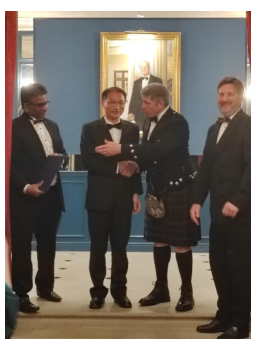
Fig 16 Taking a photo with the Training Assessment Committee
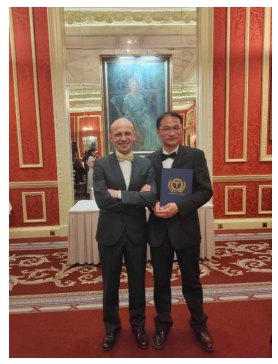
Fig17 Taking a photo with my mentor, Mr. Rami. Issa. in the ceremony
2024.06.19








